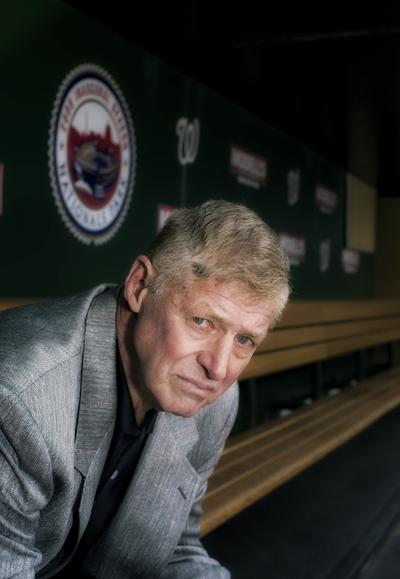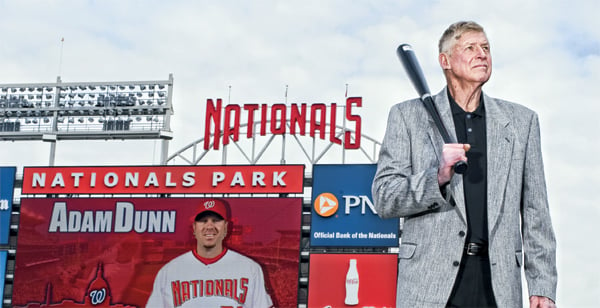The year was 1964. Frank Howard was 28 and one of the most feared hitters in baseball. The Los Angeles Dodgers had just traded him to the Washington Senators.
“Many thought of it as a comedown,” Howard says. “For me, it was a chance to put bread on the table.”
He was always a meat-and-potatoes kind of guy.
In LA, Howard was known for belting baseballs great distances. He helped the Dodgers win the 1963 World Series. His homers provided most of the runs Sandy Koufax needed for two of his no-hitters, one of them in 1962, the other in 1964.
The Dodgers called him Hondo, after John Wayne’s character in the 1953 film of that name, about an Army scout in the west. Hondo would have been happy to stay in LA, but the Dodgers traded him after the team moved to a new stadium where it was harder to hit home runs. The 2,700-mile trip took him from the penthouse of the National League to the basement of the American. But it gave him a second chance.
“In LA, I was basically a fourth outfielder,” he says. “Coming here gave me a chance to play every day. My numbers went up.”
Howard’s first season with the Senators in 1965 wasn’t his best. He played 143 games in left field, hit 21 homers, and rang up a .289 batting average. In 1968 he earned the nickname the Capital Punisher after he hit 10 home runs in 20 at-bats. Seats in RFK Stadium’s upper deck where his home runs landed got painted white.
Hondo and I meet at his home in Aldie, just east of Middleburg. The six-foot-eight frame that he used to unfurl as he approached the plate is now a bit stooped; grins come quickly and etch deep lines in his face. Since his retirement in 1974, he has managed and coached and worked in player development around the majors. At age 72, his memory and his wit are as sharp as ever.
What was he making that first year in Washington?
“I think it was $125,000,” he says. “That was big money in those days. We rarely made enough money to not work in the off-season.”
A week after my interview with Howard, the Nationals sign Cincinnati outfielder Adam Dunn to a two-year deal worth $20 million. I get Howard on the phone.
“They’re making them bigger, faster, smarter,” he says. “It’s well worth the price of admission.”
The day the team rolls Dunn out, I go down to Nationals Park to meet the new slugger. We meet in the locker room. His hand swallows mine, just as Hondo’s did.
Comparisons to Howard are inevitable. “I think this could be the power hitter we’ve been missing in DC since my childhood hero, Frank Howard,” Nationals co-owner Mark Lerner told reporters.
Dunn is six-foot-six and 275 pounds, a bit shorter, a few pounds heavier, and at age 29 a year older than Howard was when he came to Washington.
Ever meet Howard?
“Not yet,” Dunn says. “But I’m looking forward to it. I saw the white seats at RFK Stadium that he had hit with his 500-foot homers. How is that humanly possible?”
I have 15 minutes with Dunn. By the time I get to him, his new Nats hat is cocked to the side and his eyes have a slightly glazed look. My time with him comes after the press conference attended by his wife, Rachel, and his two-year-old son, Brady. TV and radio reporters already have worked him over.
I get the sense that Howard and Dunn share qualities beyond size. Both come from the American heartland—Howard from Columbus, Ohio, Dunn from Porter, Texas, north of Houston. Howard played basketball at Ohio State; Dunn played football for the University of Texas. Both come off as gentle, easygoing big men, quick to smile and in love with the game.
Dunn’s nickname is Big Donkey.
One is in the bloom of life, still with lots to learn; one is full of lore and lessons and is ready to teach. On matters basic to baseball and life, they see eye to eye.
Let’s start with steroids.
“I really don’t care what other people do,” Dunn says. “It’s not going to help you hit the ball, but it will harm your body.”
The week the Nats sign Dunn, news in the baseball world is dominated by the revelation that New York Yankees star Alex Rodriguez has taken illegal substances.
“What aggravates me,” Dunn says, “is that fans lump all players together in the ‘steroid era.’ There are guys like Ken Griffey Jr. who are totally clean. Now there’s doubt on all of us, like a black cloud.”
Howard played long before steroids and hormones started showing up in the blood of ballplayers. “But,” he tells me, “there were always heavy drinkers. We had a hell of a drug problem, too. There was plenty of pot around.”
Like Dunn, Howard declines to wag his finger at individuals.
“It’s hard to stand in judgment,” he says. “Pitchers often loaded up their gloves with spitballs. They were trying to survive.”
But is it fair? How would he feel if the pitcher he faced was juiced up on steroids?
“Bring it on,” he says. “Let’s do it.”
Howard used to take batting practice by standing at the plate and taking pitch after pitch after pitch. Pull 20 to left, whack scores up the middle, spray another few dozen to right, and then swing for the fences.
“I remember watching Roberto Clemente practice,” he says. Howard gets up from his dining-room table, takes a few steps into the open space between the table and the kitchen, and gets into a crouch, as if fielding grounders. “I remember playing with Clemente and Juan Pizarro and Luis Tiant down in Puerto Rico. They practiced all day. It’s all about repetition. If you want to improve your skills, you have to work—hard. Talent will take you only so far.”
When he coaches young players, he preaches the work ethic of the stars of his day. “You have to be an absolute idiot if you don’t take a page out of their book,” he says.
Adam Dunn smiles when I ask if he subscribes to the old-school approach of relentless practice. “I’m a big video guy,” he says. “I like to watch myself hit. I can tell by the video what I’m doing wrong. Call it the brand-new school. It’s the times.”
When I tell Howard about Dunn’s preference for video, he says film was a tool back in his day: “Hitting instructors didn’t believe in it. But when a guy sees the visualization of the way he’s swinging, a picture can be better than a thousand words, maybe even better than my BS.

“We can always learn more about the game. Video helps. It’s made me a believer.”
Howard believed he could play more and blossom as a player when he came to Washington after seven years with the Dodgers. Adam Dunn, after eight years with the Cincinnati Reds, has the same potential.
Their records match in many ways.
Howard wasn’t a great fielder for the Dodgers, but he was good for 20 to 30 home runs a year. A durable athlete, he played about 120 games a season when he started for LA.
Dunn isn’t known for his fielding, but he has hit more home runs for the Reds than Howard hit for the Dodgers. In four of his eight seasons, he hit 40 or more homers.
Howard struck out; Dunn draws walks.
Says Howard: “He’s much more disciplined at the plate than I was.”
Hondo became a local legend in 1967 when he sent 36 balls over the fences. He hit 44 the next year, 48 in 1969, 44 again in 1970. He was the heart of the Senators offense, such as it was.
“Washington was first in war, first in peace, and last in the American League,” he says. “We didn’t have enough depth or talent to compete with the good ball clubs.”
Will Dunn give the last-place Nationals a shot of energy and excitement?
“He will give that third baseman Ryan Zimmerman some help,” Howard says. “They will be the team’s two cornerstones.”
Outfielders Elijah Dukes and Lastings Millidge have potential. “Both are great athletes,” Howard says. “If one of those players can come forward and play, it would give the Nationals some real depth.”
As Howard reached his full potential with the Senators, he never had the chance to get revenge on the Dodgers. The teams were in different leagues, and in those days there was no interleague play except the World Series.
But Dunn will get the chance to take the field against his former team. I ask whom he’d most like to beat.
He smiles: “Let’s just say I’ll be happy to play Cincinnati.”
This article first appeared in the April 2009 issue of The Washingtonian. For more articles from that issue, click here.



















